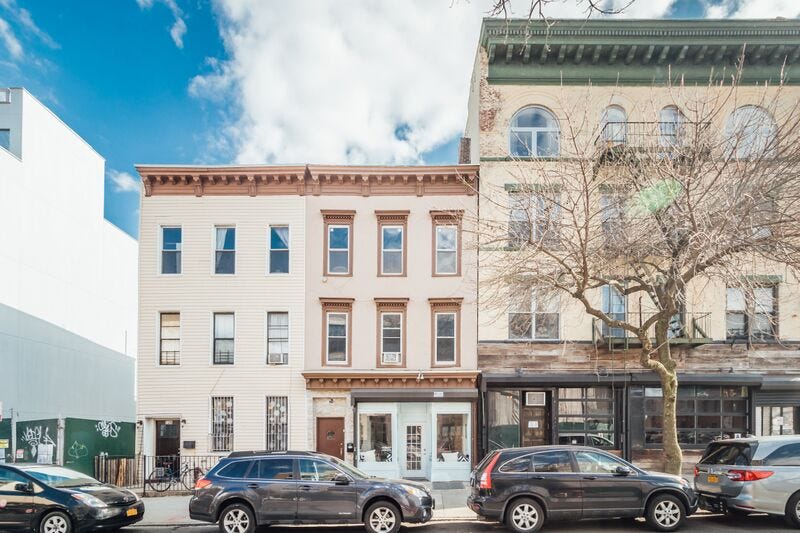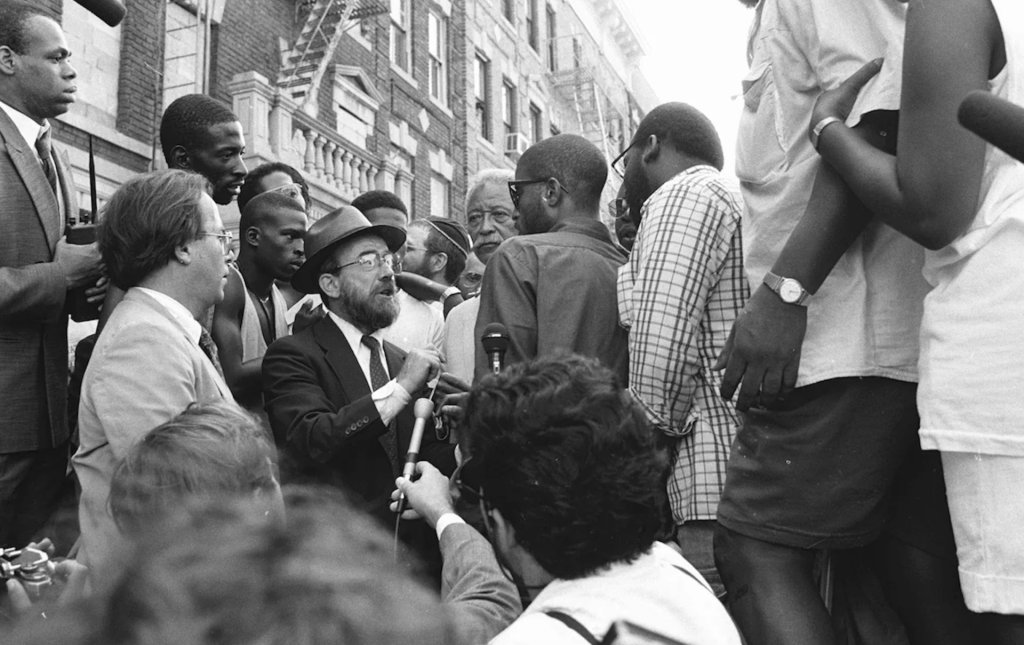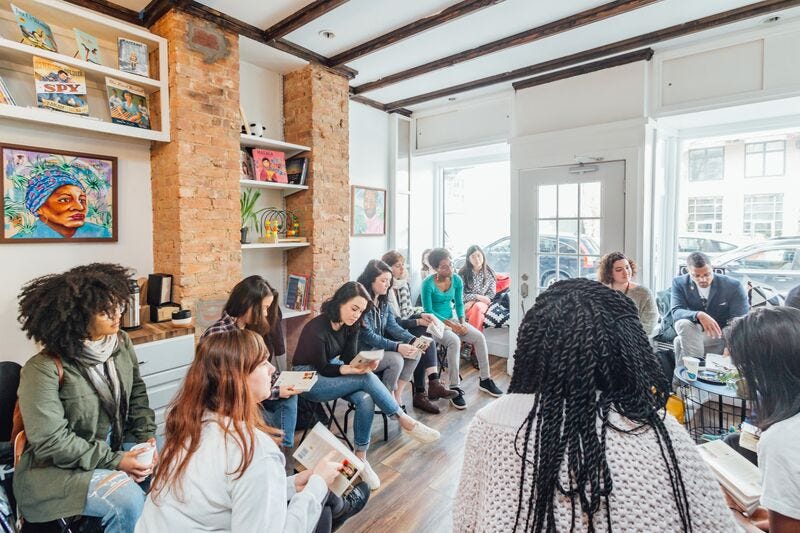Grounds for Resistance: How A Feminist Coffee and Bookshop in Brooklyn Turned a Page on Its Neighborhood’s History of Gentrification

Cafe Con Libros is a quaint shop located in the heart of Brooklyn. Its shelves are piled high with feminist literature, and its air is rich with notes of espresso and customer chatter. But with its unassuming turquoise paint and hipster minimalist window display, Cafe Con Libros also stands on the frontlines of an uphill battle to unify an increasingly gentrified community.
The storefront faces a street with half a century’s worth of racial violence and gentrification bubbling beneath its surface. From the bloody Crown Heights Riot that erupted in the 90s, to the Black families being bought out of their homes today in 2023, the shop’s 724 Prospect Place address packs a mighty punch. Yet this conflict never deterred Cafe Con Libros’ owner, Kalima DeSuze, from opening her coffee and bookstore here. In fact, the neighborhood was why she decided to open Cafe Con Libros.
A North Crown Heights native, DeSuze considers herself interlocked with the rich culture and past of the neighborhood. “I aim to bring the folks together who would normally not feel comfortable with one another,” she explains (Fernández).
To understand how Cafe Con Libros came to be is also to understand how North Crown Heights came to be.

A Brief History
The beginnings of Brooklyn’s gentrification trace back as early as the 1950s when Crown Heights was predominantly White and Jewish. Approximately 920,000 Jewish people had settled in Brooklyn by this decade, but as the 1960s began, and Jewish, Italian, and Irish families began moving East on a new expressway, Black families eagerly moved into the empty homes (Heilman). In the 60s, 70% of the neighborhood was White. By the 1970s, 70% of the neighborhood was Black (Goldschmidt). The only exception to this rapid flip was a large portion of the Hasidic Jewish community, who stayed in the area for a local synagogue that was home to the worldwide Lubavitch movement.
On August 28th, 1979, Kalima DeSuze was born. She grew up a six-minute walk from the front door of the building that would become Cafe Con Libros, and all her Afro-Latina family lived up and down the street. She vividly recalls a North Crown Heights crowded with old community convenience stores and African hair-braiding spots. “I have a deep affinity and love for and connection to the area that I grew up in,” she says (Rebecca). This strong sense of place along Prospect Place exists largely because of her cherished childhood memories of it (Cresswell), but gone now is that primarily Black and low-income place she knew as a girl (Fernández). Its old feeling started to fade, and interracial violence began to brew.
The 80s saw a slow and gradual increase in the racial divide of Crown Heights. Most of the White people who stayed in the area were Jewish and either owned property or had a job that they didn’t want to leave. The new Black residents who moved in consequently became their tenants or employees, creating an uncomfortable power dynamic between the two racial communities.
Antisemitic sentiment escalated in Crown Heights as a result. In the words of James Baldwin, “the most ironical thing about Negro anti-Semitism is that the Negro is really condemning the Jew for having become an American white man — for having become, in effect, a Christan” (Baldwin).
Then, at around 8:20 PM on August 19th in 1991, two black children of Guyanese immigrants were struck by a car running a red light in a motorcade for the Lubavitch movement’s leader (Getlin). One was killed, the other injured. A violent race riot in Crown Heights followed. Grieving Black youth of the neighborhood attacked their Jewish neighbors, injuring several and stabbing one to death. The rioting lasted three days. By the end, 152 police officers and 38 civilians were injured (Getlin).

In the late 90s and early 2000s, urban renewal projects intended to repair the violence and crime catalyzed the gentrification happening today. Between 2000 and 2015, the area saw a 23% decrease in Black residents and a 205% increase in White residents (“Observer”). The median rent shot up from $870 to $1230, according to a study conducted by NYU’s Furman Center for Real Estate and Urban Policy (“State of New York City’s Housing and Neighborhoods in 2018.”).
DuSuze told a local publication that coffee shops are a classic marker for redlining and that one popping up is often received by residents as an immediate signal that the neighborhood is “done for” (Fernández). However, she took this only as a challenge to prove the opposite to her community. Fueled by the love of literature her mother instilled in her as a child, DeSuze knew how to make her dreams come true.
On December 23rd of 2017, she opened her bookshop Cafe Con Libros. With the help of her husband and barista co-partner, Louis, the store also began selling hand-crafted beverages. Their affordable espresso drinks quickly drew in local Brooklynites — their largest latte costing only $4.
DeSuze fought to overcome the misconception she got from her Afro-Latina community about a feminist bookstore: “Oh, that’s for white folk, that’s not for us” (Fernández). The left-hand window boasts Sally Rooney’s Beautiful World, Where Are You? and Lovely War by Julie Berry, but also features The Crunk Feminist Collection and The Misadventures of Awkward Black Girl by Issa Rae.
As the academic Daphne Spain argues in her study of Feminist Bookstores, women visit feminist bookstores “to see themselves in the books, and the ways books were displayed simplified their search. It was important to stock books by and about African American and Latina women, and equally important to make those collections visible” (Spain). According to Cafe Con Libros website, the shop aims to “offer feminist texts for all personalities, political affiliations, temperaments, and tastes.” Their selection means to “represent as many identities as possible.” They even proudly offer selections for what they affectionately call their “baby, budding feminists.” Picture books and children’s toys take up the entire right-hand side of the window display, for all the young families nearby.
The store hosted its first book club meeting on January 28th, 2018, where they discussed the translated work The Alchemist by Paulo Coelho through a feminist lens. Cafe Con Libros quickly became a community meeting spot, the organization Renegade Reading Series making its first pop-up visit on June 10th of 2018. Similarly, on October 6th in 2018, the store also participated in the Brooklyn Lit Crawl later that year. The next spring, they launched their podcast Black Feminist & Bookish on February 9th and had their first-ever pop-up location at the Women’s International Day event on March 8th (@cafeconlibros_bk).

The store paused its in-person shopping at the start of the COVID-19 pandemic on March 19th, 2020. They transitioned to selling online and double-downed on their social media and web presence. They then restructured their book club meetings to run online, having their first digital discussion on the 23rd. They even began a coffee bean delivery service for their local customers on April 6th. DeSuze and her team got even more creative after their shop returned to a new normal after the pandemic, launching a book subscription service earlier this year on January 23rd (@cafeconlibros_bk).
North Crown Heights and Cafe Con Libros Today
First and foremost, Kamila DeSuze sells books and coffee because she loves them. But she also sells them as a means of resistance and reclaimation. She resists the idea that a coffee shop should signal gentrification, or that coffee belongs exclusively to the rich and the White. The shop’s name, which is a play on the Spanish phrase for “Cafe Con Leche” — meaning “Coffee With Milk” — translates instead to “Coffee with Books.” Coffee is the fruit of the global south, as she hammers in the interview below with On the Block. The very name of her shop helps her fight the gentrification of coffee and books.

In 2023, North Crown Heights looks different than it did 70 years ago. Shared spaces like Cafe Con Libros work hard to build relationships and a sense of understanding between the different communities living next door to one another in Brooklyn. The history of Cafe Con Libros specifically dismantles the idea that African, Latina, Jewish, Muslim, or queer women shouldn’t feel welcome in feminist places and be encouraged to participate in feminist discourse together.
Rather than foster the sense of other-ing and separatism that led to death outside her storefront, Kalima is a community builder. All women are invited to spend an afternoon in the cramped space of Cafe Con Libros, bumping elbows while sipping their warm mugs of coffee, cracking open their new paperbacks, and maybe even turning a new page on Crown Heights’ sense of place.
Text Citations
Baldwin, James. “Race and Rights: April 9, 1967; Negroes Are Anti-Semitic Because They’re Anti-White.” The New York Times, The New York Times, 14 Apr. 1996, www.nytimes.com/1996/04/14/magazine/race-and-rights-april-9-1967negroes-are-antisemitic-because-theyre.html.
Cresswell, Tim. “Defining Place.” Place: A Short Introduction, Blackwell, Malden, MA, 2011.
Fernandez, Stacey. “This Afro-Latina’s Feminist Bookstore Is Building Community in Gentrifying Crown Heights.” Remezcla, 10 Mar. 2018, remezcla.com/features/culture/this-afro-latinas-feminist-bookstore-is-building-community-in-gentrifying-crown-heights/.
Goldschmidt, Henry. “Race and religion among the chosen people of Crown Heights.” Rutgers University Press, 2006.
Heilman, Samuel C. Portrait of American Jews: The Last Half of the Twentieth Century. United States, University of Washington Press, 2011.
“Intersectional Feminist Bookstore: Cafe Con Libros: New York.” Cafe Con Libros, www.cafeconlibrosbk.com/. Accessed 18 Sept. 2023.
Rebecca. “Badass Women: Kalima Desuze, Founder of Feminist Bookstore, Cafe Con Libros.” Medium, Coconuts, 28 June 2018, medium.com/coconuts/badass-women-kalima-desuze-founder-of-feminist-bookstore-cafe-con-libros-c64e0f8ed358#:~:text=%E2%80%9CI%20have%20a%20deep%20affinity,wants%20to%20continually%20invest%20in.
Spain, Daphne. “Feminist Bookstores: Building Identity.” Constructive Feminism: Women’s Spaces and Women’s Rights in the American City, 1st ed., Cornell University Press, 2016, pp. 84–110. JSTOR, http://www.jstor.org/stable/10.7591/j.ctt18kr5mx.8. Accessed 7 Oct. 2023.
“State of New York City’s Housing and Neighborhoods in 2018.” NYU Furman Center, 2018.
“Two Years after the Riots in Crown Heights, Blacks and Hasidic Jews Are Still Demanding Justice and Nurturing Peace. : Rage and Atonement.” Los Angeles Times, Los Angeles Times, 29 Aug. 1993, www.latimes.com/archives/la-xpm-1993-08-29-vw-29286-story.html.
Photography Citations
Cafe con Libros. @cafeconlibros_bk. Instagram. https://www.instagram.com/cafeconlibros_bk/
Coleman, Arica L. “Crown Heights Riot at 25-Troubled of Black & Jewish Activism.” Time, Time, 22 Aug. 2016, time.com/4460730/crown-heights-anniversary-blm-platform/.
“Crown Heights, 30 Years Later: Looking Back on the Riot That Tore the City Apart.” CBS News, CBS Interactive, 19 Aug. 2021, www.cbsnews.com/newyork/news/crown-heights-riots-30-years-later/.
Militare, Jessica. “Her Bookstore Survived the Pandemic by Closing its Doors and Building New Skills.” Fobes, 6 Jul. 2021, https://www.forbes.com/sites/officedepotofficemax/2021/07/06/her-bookstore-survived-the-pandemic-by-closing-its-doors–building-new-skills/?sh=73c791707773
“Portraits by Chris Setter.” NYC Photographer Chris Setter, www.chrissetter.com/. Accessed 18 Sept. 2023.
Video and Audio Citations
Aboveboard Media, director. On the Block | Cafe Con Libros. YouTube, 5 Mar. 2021, https://youtu.be/oGQtWRjdmLE. Accessed 7 Oct. 2023.
Black Feminist & Bookish. “Black Feminist & Bookish.” Spotify.

0 Comments